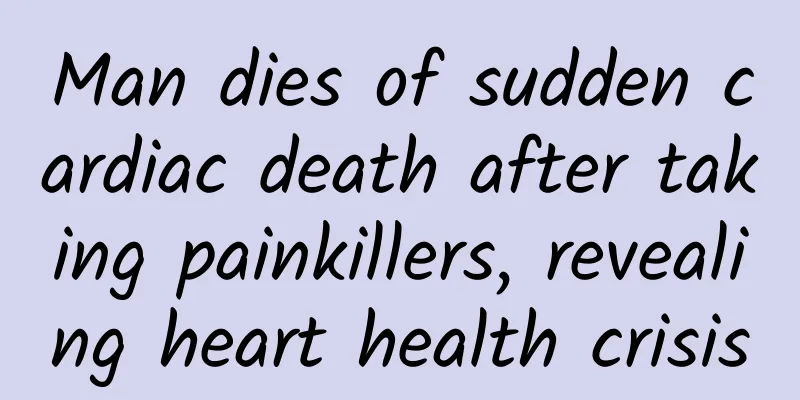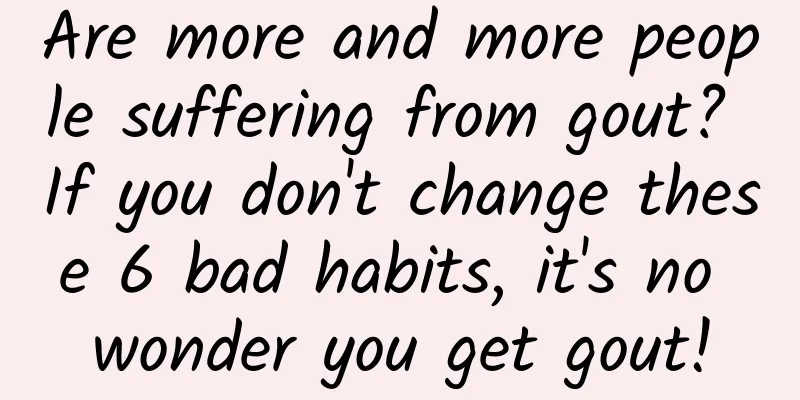Man dies of sudden cardiac death after taking painkillers, revealing heart health crisis

|
Recently, a news report about a man who died suddenly from a heart attack after taking painkillers purchased from a pharmacy has attracted widespread attention. This incident has once again brought sudden cardiac death, a serious health issue, into the public eye. Sudden cardiac death is an extremely dangerous and often sudden condition. Let's take a closer look at this issue. 1. Definition of sudden cardiac death Sudden cardiac death refers to sudden death caused by heart reasons. Usually, patients may suffer from cardiac arrest within 1 hour after the onset of symptoms, or even instantly, leading to death. The most common causes are cardiovascular diseases, including coronary heart disease, cardiomyopathy, arrhythmia, etc. The heart is the core organ of the human body, responsible for transporting blood to all parts of the body. Once the heart has serious problems and cannot work normally, it will quickly endanger life. 2. Predisposing factors of sudden cardiac death 1. Disease factors 1. Coronary heart disease: This is one of the main causes of sudden cardiac death. Coronary atherosclerosis causes blood vessel narrowing or blockage, affecting the blood supply to the heart. When myocardial ischemia is severe, it may cause arrhythmia or even cardiac arrest. 2. Cardiomyopathy: including dilated cardiomyopathy, hypertrophic cardiomyopathy, etc. These diseases affect the structure and function of the heart, making the heart fragile and prone to arrhythmia and sudden death. 3. Arrhythmia: Severe arrhythmias such as ventricular tachycardia and ventricular fibrillation can cause the heart to be unable to pump blood normally, which can lead to life-threatening situations in a short period of time. 2. Lifestyle factors 1. Overwork: Long-term high-intensity work and lack of rest will put the body and heart in a state of extreme fatigue, increase the burden on the heart, and easily induce sudden cardiac death. 2. Emotional excitement: Severe emotional fluctuations, such as anger, sadness, excitement, etc., will lead to sympathetic nerve excitement, release a large amount of hormones such as adrenaline, accelerate the heart rate, increase blood pressure, and increase the risk of sudden cardiac death. 3. Smoking and drinking: Harmful substances such as nicotine and tar in tobacco can damage the cardiovascular system, leading to vasoconstriction, arteriosclerosis, etc.; excessive drinking can affect the rhythm and function of the heart and increase the chance of arrhythmia. 4. Lack of exercise: Long-term lack of exercise can reduce the body's metabolic function and easily lead to obesity, hypertension, diabetes and other diseases, which are risk factors for sudden cardiac death. Appropriate exercise can help enhance heart function and reduce the risk of disease. (III) Other factors 1. Drug factors: Some drugs may have adverse effects on the heart, such as some weight loss drugs, antiarrhythmic drugs, painkillers, etc. When using drugs, you must strictly follow the doctor's instructions and understand the adverse reactions and precautions of the drugs. 2. Environmental factors: Extreme weather conditions such as cold and high temperatures, as well as sudden shock, can also induce sudden cardiac death. Especially for people with cardiovascular diseases, they should pay more attention to the impact of environmental changes on the body. 3. Preventive measures for sudden cardiac death Regular physical examinations are essential for the middle-aged and elderly, as well as those with a family history of cardiovascular disease, hypertension, diabetes and other risk factors. Physical examinations should include electrocardiogram, cardiac ultrasound, blood pressure, blood lipids, blood sugar and other tests, so as to detect potential cardiovascular problems in time and take appropriate treatment measures. 1. Reasonable diet: Maintain a balanced diet, reduce the intake of high-fat, high-salt, and high-sugar foods, and eat more fresh vegetables and fruits, whole grains, and foods rich in high-quality protein. 2. Moderate exercise: Choose the appropriate exercise according to your own situation, such as walking, jogging, swimming, Tai Chi, etc., and do at least 150 minutes of moderate-intensity aerobic exercise every week. When exercising, pay attention to gradual progress and avoid excessive fatigue. 3. Quit smoking and limit alcohol consumption: Resolutely quit smoking, try to avoid drinking, or limit the amount of alcohol consumed. Men should not drink more than two standard drinking units per day (one standard drinking unit is equivalent to 14 grams of pure alcohol), and women should drink less. 4. Control your emotions: Learn to regulate your emotions, keep a calm mind, and avoid excessive tension, anxiety, and anger. You can relieve stress and mood swings through meditation, deep breathing, and listening to music. 5. Follow the doctor's instructions for treatment: If you already have cardiovascular disease, you must strictly follow the doctor's instructions for treatment, take medicine on time, and have regular checkups. Do not increase or decrease the dosage or stop taking the medicine on your own, so as not to affect the treatment effect and increase the risk of sudden death. 6. Pay attention to environmental changes: In cold weather, keep warm to avoid cold stimulation that causes vasoconstriction; in hot weather, pay attention to heatstroke prevention and cooling to avoid heat stroke and dehydration. At the same time, try to avoid sudden shock and drastic environmental changes. 4. First aid measures for sudden cardiac death 1. Call the emergency number immediately: If you find that the patient has cardiac arrest, you should immediately call the local emergency number (such as 120). Stay calm and clearly inform the operator of the patient's condition and exact location to ensure that rescuers can arrive quickly. 2. Perform cardiopulmonary resuscitation (CPR): While waiting for the arrival of emergency personnel, if there is someone on the scene who has cardiopulmonary resuscitation skills, they should start CPR immediately. The correct CPR steps include: chest compression, lay the patient flat on a hard surface, put your hands on top of each other, and use the base of your palms to press quickly and forcefully on the middle of the patient's sternum. The compression depth should be at least 5 cm, but not more than 6 cm, and the frequency should be maintained at 100 to 120 times per minute; open the airway, gently lift the patient's chin, tilt the head back, open the airway, so that the patient can breathe; artificial respiration, if trained, you can give the patient mouth-to-mouth artificial respiration. If you are not trained, you can only perform chest compressions; use an automated external defibrillator (AED). If an AED is available on site, it should be used immediately. AED is a device that can analyze heart rhythm and deliver electric shock defibrillation. It is very critical and easy to operate. Follow the voice instructions of the AED and operate it. Through these first aid measures, we can buy a very precious chance of survival for patients with sudden cardiac death before the arrival of professionals. However, the most important thing is prevention. Through a healthy lifestyle and regular medical examinations, we can greatly reduce the risk of sudden cardiac death. Although sudden cardiac death is terrible, it is not unpreventable and untreatable. By raising public awareness of this issue, strengthening preventive measures, and taking the right actions in emergency situations, each of us can play an important role in protecting lives. Let us work together to protect the heart health of ourselves and others, so that sudden cardiac death will no longer be a silent killer of life. |
Recommend
Why does a needle prick in the left lower abdomen of a woman cause pain?
First of all, most people have experienced a cert...
How to regulate female hormones
Many girls experience irregular menstruation, flu...
How to treat right adnexal cyst on B-ultrasound?
The adnexal cyst that people often talk about can...
How to maintain after hysterectomy?
Every woman should know that the uterus plays an ...
Sensor Tower: Global Twitch mobile installations reached 22 million in Q1 2021, a year-on-year increase of 62%
The global outbreak of COVID-19 in 2020 has led t...
How do I deal with my best friend living with my boyfriend? What should I do if my best friend lives in my boyfriend's house?
We all know that relationships between people are...
What vegetables are good to eat during confinement?
After a woman gives birth to a child, many nutrie...
Diet tips for regulating mood! How to eat sweet, sour, bitter, spicy and salty to get a good mood
"Suwen Xuanming Wuqi" states: "The...
What's wrong with nausea and lower abdominal pain?
Many women suffer from lower abdominal pain, but ...
Recurrence of cervical polyps
Uterine polyps are a relatively common gynecologi...
Can I eat dried fruits during confinement?
The purpose of confinement for new mothers is ver...
What is the best treatment for urethritis in women?
The female urethra is relatively fragile, and the...
How many days after menstruation does a woman ovulate?
If you want to get pregnant as soon as possible, ...
Things to note after laparoscopic surgery
What is the whole process of laparoscopy? First, ...









